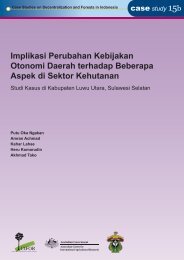Adaptive collaborative management of community forests in Asia ...
Adaptive collaborative management of community forests in Asia ...
Adaptive collaborative management of community forests in Asia ...
Create successful ePaper yourself
Turn your PDF publications into a flip-book with our unique Google optimized e-Paper software.
Chapter 3: <strong>Adaptive</strong>ness and Collaboration <strong>in</strong> Community Forestry <strong>in</strong> Nepal • 55<br />
shifted towards more equitable and propoor development, <strong>in</strong>clud<strong>in</strong>g the<br />
formulation <strong>of</strong> the Forest Act 1993, which was <strong>in</strong>tended to shift the control<br />
over forest from the state to local communities.<br />
S<strong>in</strong>ce approximately 1999, however, the armed conflict between the<br />
Maoist rebels and the monarchy and government has diverted much <strong>of</strong><br />
the nation’s attention and resources. As <strong>of</strong> 2007, a multilateral ceasefire<br />
had been declared, and a democratic constituent assembly was to be<br />
elected. Rural life had returned to ‘normal’, albeit with the aftermath <strong>of</strong><br />
prolonged violent conflict to deal with, and <strong>community</strong> forest users were<br />
conduct<strong>in</strong>g their activities without fear. Although the toll on resources,<br />
leadership and livelihoods has been considerable, the promise <strong>of</strong> an elected<br />
constituent assembly, a return to democracy and further decentralisation<br />
makes many forest stakeholders somewhat optimistic about local rights and<br />
natural resource <strong>management</strong>. In this period, a whole array <strong>of</strong> marg<strong>in</strong>alised<br />
people—<strong>in</strong>clud<strong>in</strong>g Madhesi (people <strong>of</strong> the Terai region <strong>of</strong> southern Nepal),<br />
ethnic m<strong>in</strong>orities, Dalits (people <strong>of</strong> the so-called ‘untouchable’ caste<br />
groups) and women—have come forward to engage <strong>in</strong> open public politics,<br />
even tak<strong>in</strong>g to the streets to assert their claims. Although affected by the<br />
conflict (Box 3-1), <strong>community</strong> forestry has probably rema<strong>in</strong>ed Nepal’s most<br />
resilient local <strong>in</strong>stitution (Banjade and Tims<strong>in</strong>a 2005; Ojha and Pokharel<br />
2006; Pokharel and Paudel 2005) 6 .<br />
Box 3-1. National conflict and <strong>community</strong> forestry<br />
The security situation at the time <strong>of</strong> the ADB research project added complexity<br />
to the <strong>community</strong> forestry landscape. Although the Maoist <strong>in</strong>surgents did not<br />
target <strong>community</strong> forestry as much as other government-related <strong>in</strong>itiatives,<br />
many CFUGs were nonetheless affected. For example, fear<strong>in</strong>g encounters<br />
with the army or Maoists, some CFUGs limited or even stopped their forest<br />
products harvest<strong>in</strong>g. This fear, Fear, the risk <strong>of</strong> be<strong>in</strong>g caught <strong>in</strong> the crossfire<br />
(Katel et al. 2006), the frequent banda (strikes), the recurr<strong>in</strong>g state-<strong>of</strong>-emergency<br />
limitations and <strong>in</strong>ternational opposition to the monarchy’s clamp-down on civil<br />
rights and dissolution <strong>of</strong> the elected parliament suppressed both Nepali and<br />
<strong>in</strong>ternational <strong>community</strong> forest-related <strong>in</strong>itiatives, <strong>in</strong>clud<strong>in</strong>g large gather<strong>in</strong>gs like<br />
CFUG general assemblies. Some CFUG and other local political leaders and<br />
district forest <strong>of</strong>fice staff faced threats <strong>of</strong> physical harm or expulsion from the<br />
<strong>community</strong>, and some district forest <strong>of</strong>fices were destroyed. Some CFUGs were<br />
pressured to pay a levy to the <strong>in</strong>surgents, and <strong>in</strong> a few <strong>in</strong>stances, they were<br />
apparently <strong>in</strong>structed to dissolve. Although this posed some challenges for the<br />
research project, especially <strong>in</strong> terms <strong>of</strong> travel and group meet<strong>in</strong>gs, the <strong>in</strong>clusive,<br />
propoor and flexible nature <strong>of</strong> the ACM approach was well suited to the volatile<br />
political context.
















